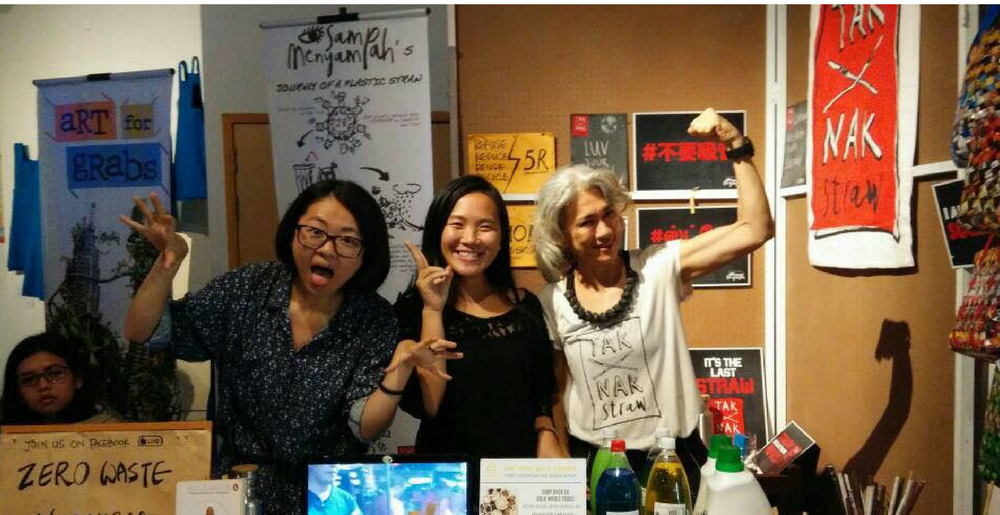Sampah, Menyampah is a green initiative that wants to gather the positive energies and ripples of citizens to make an impact in our ecosystem.
Carolyn Lau, co-founder of Sampah, Menyampah and stay-at-home mom, joined forces with ex-Star reporter Norlin Wan and yoga instructor Mareena Kerschott-Yahya to work towards a cleaner, healthier, unpolluted, and community-spirited Malaysia.
“We were tired of complaining about the state of things, so we decided to take matters into our own hands and do what we can.”
“We also felt that there were not enough local context for green consciousness to grow locally, and in local language.”
Therefore, to reinforce the ramifications of environmental neglect, they give talks at schools and attend eco-friendly events, the Borneo Eco Film Festival and KLEFF.
Launched in March 2017, their first campaign is Tak Nak Straw, a movement that encourages people and restaurants alike to say no to straws.
They also collaborate with other zero-waste movements like The Hive, Malaysia’s first zero-waste shop run by Claire Sancelot. She helps to promote Tak Nak Straw from time-to-time when she does her promotional talks for The Hive.
Marissa Parry-Rozario, model and co-owner of Purely B manages the social media and helps to get restaurants onboard the plastic straw-free movement. Ishra Kamiso, 16-year old daughter to Norlin, is the Tak Nak Straw youth ambassador and does her part with talks and workshops with Carolyn in the schools.

To increase their impact, they hold workshops on how to make biodegradable straws to connect with the audience to effectively reduce plastic wastage.
“We use recycled kraft paper—because it’s free, cheap, recycled, and does not add more waste, has non-toxic glue and refined paraffin wax.”
Biodegradable straws can be made out of papaya stems, paper, and bamboo. They can last for two to three years with multiple uses, as opposed to plastic straws which are disposed of after a single use.
These plastic straws are harmful to sealife such as fish and sea turtles. On many occasions fishermen have hooked up fish only to discover plastic microfibres in their guts, and straws stuck in sea turtles noses.
Ultimately, they plan to move the campaign beyond biodegradable alternatives to NO straws entirely.
“We are planning a straw-free map that participating F&B outlets can be tagged on to boost awareness and provide a mapping of those participating.”
“Plus, we are also putting together multilingual downloadables consisting of posters illustrating the journey of a plastic straw so that people can spread them throughout their communities, schools and colleges.”
The first step itself is simple: simply saying NO to taking a straw when you order a drink at restaurants, fast food joints or even local mamaks.
They successfully initiated a sustainable local bamboo straw-making industry with two orang asli in Selangor to cater for increasing earth-friendly straw demand. Currently they have these SetrawAsli retailed at KLIA2.
“The sale of these straws supplements the straw makers’ incomes and also helps fund our movement making us potentially sustainable. We also try to generate funding through our talks and workshops, when feasible.”
They sell SetrawAsli at RM2 per straw and are currently working with MENTARI Selayang outpatients to supply waxed paper straws locally.

They do not plan to stop there, as they plan to launch other “Tak Nak” campaigns as well—featuring “Tak Nak Bottle Air”, “Tak Nak Sudu Garpu”, “Tak Nak Tisu”, etc.
They manage the social initiative on a volunteer basis, as none of them are paid.
“We received a donation of RM600 from Art For Grabs: 50 Shades of Green in March which was useful seed money to get logos, posters and banners printed (over and above the ones printed pro-bono by generous printers).”
One of Carolyn’s grievances is the underlying attitude of the Malaysian community; while they are aware of the environment, many remain indifferent about the issues that plague it.
“I think people have gotten used to the convenience and are complacent and ignorant of the environmental stress caused by plastics such as plastic straws. And through this work I see that people want instant pop-a-pill solutions.”
As for enthusiasts, Carolyn advises to start with eliminating a single plastic packaging one at a time.
“It’s ok to be slow but focused so it has better chances of being a sustained lifestyle of choice. And its okay to ‘slip up’ as well, just challenge yourself to not add to the overfilling landfills!”
Feature Image Credit: Sampah, Menyampah













